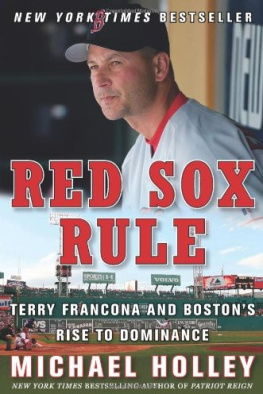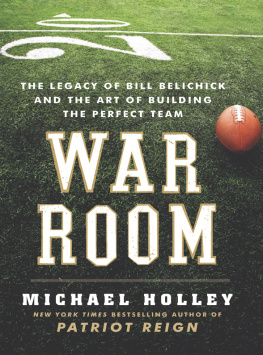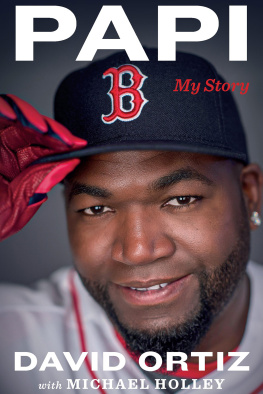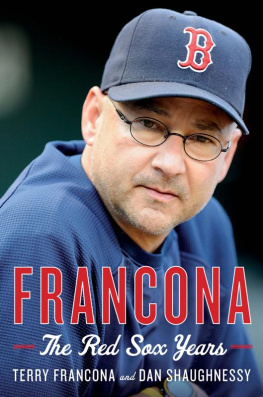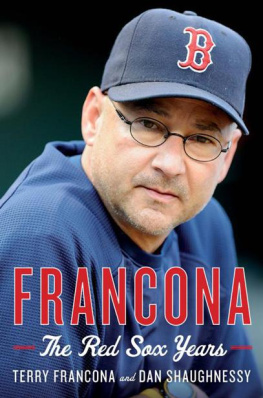Red Sox Rule
Terry Francona and Bostons Rise to Dominance
Michael Holley

For Oni,
The best manager of all:
you managed my life
when I was too busy to do it myself
Contents
W hen you live in Boston, you learn over time to accept the citys quirks. You become so well adjusted that after a while, you dont refer to them as quirks at all. What seems odd about the city to an outsider is simply clich Thats just the way it is to a Bostonian. So you get used to streets that are confusing enough to put your GPS on the fritz: there are multiple streets with the same names and streets that change names without warning, and thats assuming you caught the name in the first place. You get used to the contradiction of being in a city of 600,000 residents that still feels like a small town when people get to talking; in Boston, everyone either has a guy with political and social connections or they know a guy who knows a guy.
There are the five dozen traffic circles that you learn to navigate. Theres the democracyGrandma knows some obscene gestures, toothat you come to expect while driving. Theres the irony of such a small piece of land having so many territorial lines drawn into it. You can drive for just 3 miles and 12 minutes and travel through a republic (Cambridge), a town (Brookline), and a city (Boston). Theres the distinct accent, made famous by Kennedys and townies alike, where shots have nothing to do with tequila. Rather, shots are what you wear when its just too hot for pants. And in an area where a walk down Massachusetts Avenue will take you past the Berklee College of Music, MIT, and Harvard, theres the future you get used to seeing when you stare into the faces of 19-year-old kids: they could easily be the next Quincy Jones, the next NASA recruits, or the next well-known politicians who inspire you, for better or worse, to protest with a bumper sticker.
Like many cities, Boston has a major league baseball team. But thats where the comparisons to other cities begin and end. New York, Chicago, and Los Angeles have two teams apiece, so they have built-in checks and balances that prevent them from being as locked in on one team as Boston is on the Red Sox. Besides, those cities, with massive populations and large amounts of land, have enough room to literally and figuratively get lost in. The dazzle and intrigue of Hollywood can easily compete with and trump the accomplishments of the Dodgers and Angels. The sheer bigness, coolness, and nowness of New York City guarantee that whenever the Yankees and Mets have the citys spotlight, that spotlight is seasonal. And Chicago is so big that it could hold two or three Bostons on its shoulders without flinching from the extra weight.
Then there is Boston, the smallest big city in the United States. There are no hiding places here in the city that writer Oliver Wendell Holmes once nicknamed the Hub of the solar system. Fenway Park and the city have so much in commoncompact, old, uniquethat it often seems that one blends into the other. Neither park nor city has much sympathy for the claustrophobic. Fenway, baseballs smallest and oldest park, has the sports longest streak of consecutive sellouts: the park hasnt had a single vacancy in 388 home games, or nearly 5 seasons. People will pay $20 just to stand behind those who actually have seats on game days. Some will pay twice that amount for the right to sit directly behind a giant green pole (the seat is so bad that it makes the already euphemistic phrase obstructed view seem misleading).
In tiny Fenway, the Red Sox, Bostons Hollywood summer stars, are always being watched and judged by someone. The teams press corps is enormous, which means that players and management truly have to be close to the media, whether they like it or not. At least 50 media members cover the team away from home, with that number sometimes swelling to 75. Give or take a reporter and it means that the size of the Red Soxs road press contingent is similar to that of the group of White House correspondents who cover the President daily. The media numbers get sillier when the Red Sox are at home, when at least 135 to 150 media members show up, even when the Red Sox are playing the worst teams in the league. Last spring, the team issued 300 credentials to those who planned to cover parts of spring training in Fort Myers, Florida.
The coverage is a constant reminder of the obvious in New England, and that is that everyone always has something to say about the team. Always. Despite the crowds in the stands as well as in the press box, its not clear whether the baseball conversation begins at Fenway or simply is continued there.
Somewhere along the line it got to the point where the Red Sox werent an option, says Theo Epstein, the Boston-raised general manager of the Red Sox. Its not an elective; its a staple. Its a tradition thats more common than a family dinner.
There is no such thing as a no-baseball zone in Boston. The game is dissected in places that you would expect, such as sports bars, by people you would expect, such as males between the ages of 25 and 54, also known as the dream men for advertisers. But the dissection is so widespread that the demographics cant quite capture it. The manager of the Red Sox, Terry Francona, arrived at work one day last summer and found a message from a ranting e-mailer in his in-box. The writer profanely explained why Francona was a moron and most responsible for a regular-season loss. The criticism didnt surprise him as much as the institution from which it was sent: Harvard.
The gift and curse of the Red Sox is that they belong to everybody. They are claimed by Ivy League professors and intellectuals, by Oscar-winning actors and bestselling authors, by working women and stay-at-home moms, by those who practice the law and those who wind up on the wrong side of it. The gift is that instead of being pulled in one direction to represent a certain community or agenda, the Red Sox are surrounded by all those interests, which forms a circle. Which is also the curse: there is nothing carefree and loose about this group hug. Its expressive and intense, a passionate embrace that wont let go.
Here, asking someone about the Red Sox is like asking them if they have the time. The assumption is that they at least know what happened in last nights game, whos pitching tonight, and precisely where the Yankees are in the standings. And really, those are just the superficial talking points for short elevator rides. The real conversation, the one with substance, feels more like an heirloom. Its an in-progress discussion, a thread that began in the early 1900s that each Red Sox generation tweaks and maintains.
What it means for contemporary Red Sox management and players is this: the teams average fan is an oral historian. The city is full of fans who can seemingly walk and Google at the same time, people who can instantly connect a Red Sox slump in 2007 to the teams historic one in 1978. This is a place where names are loaded. Harry Frazee. Tom Yawkey. Bucky Dent. Bill Buckner. Grady Little. This is a place where years are loaded. 1918, when the Red Sox sold Babe Ruth to the Yankees. 1978. 1986. 2003. Of course, its a given that its a place whose unforgivable baseball sins usually have something to do with New Yorkeither losing a divisional lead to the Yankees, losing any series to the Yankees, leaving to play for the Yankees, or wearing a Yankees hat.
The citys natural voice is animated and coarse. You dont have to wait for poll results to know if youre loved or hated. If youre a member of the Red Sox, you can be loved and despised in the same week. Or game. Outside of Fenway, the city pushes you to be faster. Drive faster. Talk faster. Think faster. Move faster. At Fenway, the microcosm of the city pushes you to be better. Hit better. Run better. Draft better. Manage better.

